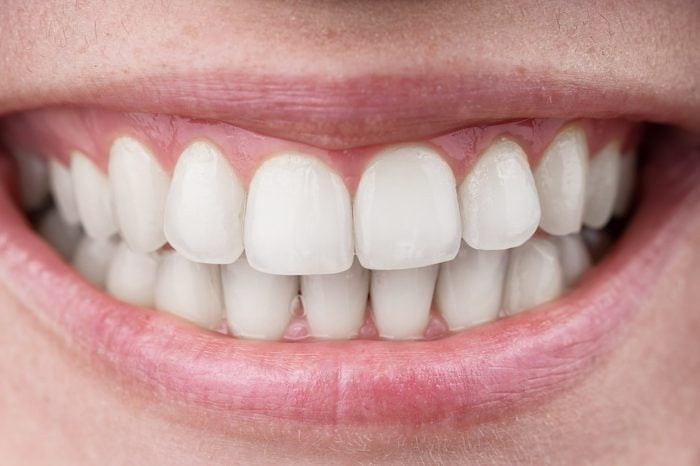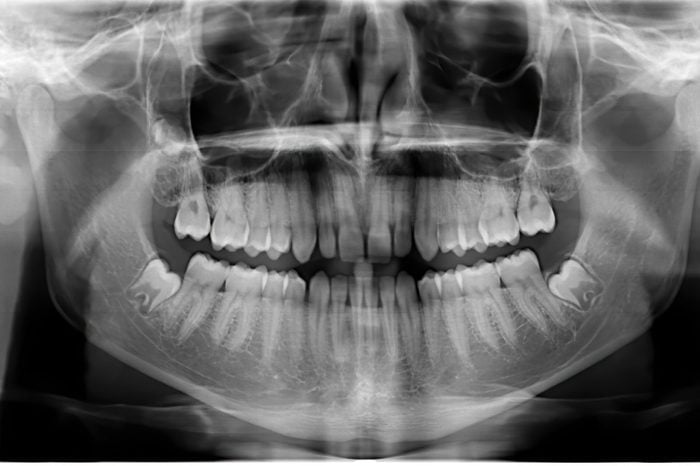
Surveys show that a majority of Americans chew gum two to three times a week, with the greatest gum-lovers averaging three pieces per day. Does that blow you away?
“It’s safe to chew gum every day,” says Ilana Kersch, RD, a clinical nutritionist who specializes in digestive diseases at NewYork-Presbyterian Columbia University Irving Medical Center. “But like all nutrition guidelines, moderation is key.”
If you’re chewing gum daily, this nutrition expert explains, you may even be reaping some health benefits—but negative effects can occur in some people, too. Here’s what happens to your body when you chew gum every day.

The good: Chewing gum can boost your mental health
A 2015 review of research published in BioMed Research International found that people who chew gum habitually report less stress and reduced anxiety. “When you chew gum, it can actually work in your brain to increase serotonin, which improves your mood,” says Michelle DiBlasi, DO, chief of inpatient psychiatry at Tufts Medical Center.
Want to Stop Stress? A New Study Found This Solution Was More Powerful Than Meditation

The bad: Chewing gum can increase your sugar intake
If you don’t stick to sugar-free gum, one stick of gum only has a small amount of sugar—about two grams, Kersch says. “But if you are in the habit of chewing sugar-sweetened gum all day, every day, the amount of sugar can add up to an amount that has a negative impact on your health.”

The good: Chewing sugar-free gum reduces your risk of dental cavities
“Chewing gum stimulates the production of saliva, which can help wash away acid and food residue that’s left in the mouth after eating and drinking,” Kersch says. According to the American Dental Association (ADA), clinical trials have found that people who chew sugar-free gum for 20 minutes after meals have fewer dental caries (cavities.)
13 Things Your Dentist Wants You to Know (But You’re Too Scared to Ask

The bad: Chewing sugar-free gum could upset your stomach
Sugar-free gums can contain sugar substitutes that don’t typically have any negative health impacts in moderation, but “if you have IBS (irritable bowel syndrome) or are prone to digestive issues, chewing large amounts of sugar-free gums can exacerbate symptoms.” Kersch says that gum with sugar substitutes like aspartame or sucralose can be a little gentler on the gut.
Keep gum with the ingredient Xylitol, which goes by several other under-the-radar names, out of the reach of pets. It can be extremely harmful or even fatal to dogs.
WHO Advises Against Using Non-Sugar Sweeteners for Weight Control

The good: Chewing gum may improve memory
A 2018 study published in Applied Cognitive Psychology found that students who chewed gum while they studied performed better on exams. The researchers suggest this is because chewing gum blood and oxygen flow to the brain, keeping us alert, focused, and more receptive to the information we’re learning.
Take This Attention Span Quiz To Measure How Well You Actually Stay Focused

The bad: Chewing gum can contribute to TMJ Disorder
“If you are a very frequent gum-chewer and regularly have headaches, jaw pain, tenderness or facial pain, this could be a sign of a condition called TMJ disorder,” Kersch says. She explains that the temporomandibular joint (TMJ) connects the jaw bone to the rest of the skull, and constant chewing or grinding can sometimes overwork the joints and muscles and lead to chronic pain.

The good: Chewing gum may help you get extra steps in
There may be a benefit to walking and chewing gum at the same time: A 2021 study published in the Journal of Exercise Science & Fitness found that when people chewed gum as they went on a walk, their walking distance, step count, walking speed and caloric burn all significantly increased.
How Many Steps Do You Really Need to Walk Each Day to Live Longer?

The bad: Chewing gum can reinforce disordered eating
Chewing gum can act as an appetite suppressant, which can be a good thing if you’re mindlessly reaching for another snack. “But it’s important to be mindful of how it can reduce your hunger cues,” Dr. DiBlasi says. “If people are restricting [their eating], chewing gum can lead to, or worsen, disordered eating patterns.”
Get The Healthy @Reader’s Digest newsletter and follow The Healthy on Facebook and Instagram. Keep reading:
